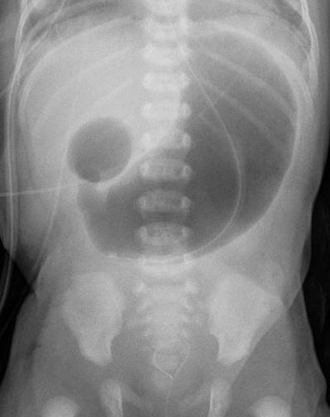Intestinal atresia

Editor-In-Chief: Prab R Tumpati, MD
Obesity, Sleep & Internal medicine
Founder, WikiMD Wellnesspedia &
W8MD's medical weight loss NYC, sleep center NYC
Philadelphia medical weight loss and Philadelphia sleep clinics
| Intestinal atresia | |
|---|---|
 | |
| Synonyms | Bowel atresia |
| Pronounce | N/A |
| Specialty | N/A |
| Symptoms | Vomiting, abdominal distension, failure to pass meconium |
| Complications | Malnutrition, dehydration, sepsis |
| Onset | Neonatal |
| Duration | Chronic |
| Types | Duodenal atresia, jejunal atresia, ileal atresia |
| Causes | Congenital |
| Risks | Polyhydramnios, Down syndrome |
| Diagnosis | Prenatal ultrasound, X-ray, contrast enema |
| Differential diagnosis | Meconium ileus, Hirschsprung's disease |
| Prevention | None |
| Treatment | Surgery |
| Medication | Intravenous fluids, antibiotics |
| Prognosis | Generally good with treatment |
| Frequency | 1 in 5,000 live births |
| Deaths | N/A |
Intestinal atresia is a medical condition that involves a complete closure of a portion of the intestine. This condition is congenital, meaning it is present at birth. The severity of the condition can vary, depending on the location and extent of the atresia.

Types of Intestinal Atresia[edit]
There are several types of intestinal atresia, each named for the part of the intestine that is affected. These include:
- Duodenal atresia - This type of atresia affects the duodenum, which is the first part of the small intestine. It is the most common type of intestinal atresia.
- Jejunal atresia - This type affects the jejunum, which is the middle part of the small intestine.
- Ileal atresia - This type affects the ileum, which is the last part of the small intestine.
- Colonic atresia - This type affects the colon, which is part of the large intestine.
Causes[edit]
The exact cause of intestinal atresia is unknown. However, it is believed to occur when the blood supply to a portion of the intestine is cut off during fetal development. This can cause the affected portion of the intestine to die and be reabsorbed, leaving a gap or atresia.
Symptoms[edit]
The symptoms of intestinal atresia can vary, depending on the location and extent of the atresia. However, common symptoms include:
- Vomiting
- Abdominal distension
- Failure to pass meconium (the first stool)
- Bilious vomiting (vomiting green bile)
Diagnosis[edit]
Intestinal atresia can often be diagnosed before birth through a routine ultrasound. After birth, the diagnosis can be confirmed through a combination of physical examination, X-ray, and barium enema.
Treatment[edit]
The treatment for intestinal atresia is surgical. The goal of the surgery is to remove the atresia and reconnect the healthy portions of the intestine. In some cases, a temporary ostomy may be needed.
Prognosis[edit]
The prognosis for intestinal atresia can vary, depending on the location and extent of the atresia. However, with prompt diagnosis and treatment, most children with this condition can go on to lead normal, healthy lives.
| Congenital malformations and deformations of digestive system | ||||||||||||||
|---|---|---|---|---|---|---|---|---|---|---|---|---|---|---|
|
Ad. Transform your life with W8MD's Budget GLP-1 injections from $75


W8MD offers a medical weight loss program to lose weight in Philadelphia. Our physician-supervised medical weight loss provides:
- Weight loss injections in NYC (generic and brand names):
- Zepbound / Mounjaro, Wegovy / Ozempic, Saxenda
- Most insurances accepted or discounted self-pay rates. We will obtain insurance prior authorizations if needed.
- Generic GLP1 weight loss injections from $75 for the starting dose.
- Also offer prescription weight loss medications including Phentermine, Qsymia, Diethylpropion, Contrave etc.
NYC weight loss doctor appointmentsNYC weight loss doctor appointments
Start your NYC weight loss journey today at our NYC medical weight loss and Philadelphia medical weight loss clinics.
- Call 718-946-5500 to lose weight in NYC or for medical weight loss in Philadelphia 215-676-2334.
- Tags:NYC medical weight loss, Philadelphia lose weight Zepbound NYC, Budget GLP1 weight loss injections, Wegovy Philadelphia, Wegovy NYC, Philadelphia medical weight loss, Brookly weight loss and Wegovy NYC
|
WikiMD's Wellness Encyclopedia |
| Let Food Be Thy Medicine Medicine Thy Food - Hippocrates |
Medical Disclaimer: WikiMD is not a substitute for professional medical advice. The information on WikiMD is provided as an information resource only, may be incorrect, outdated or misleading, and is not to be used or relied on for any diagnostic or treatment purposes. Please consult your health care provider before making any healthcare decisions or for guidance about a specific medical condition. WikiMD expressly disclaims responsibility, and shall have no liability, for any damages, loss, injury, or liability whatsoever suffered as a result of your reliance on the information contained in this site. By visiting this site you agree to the foregoing terms and conditions, which may from time to time be changed or supplemented by WikiMD. If you do not agree to the foregoing terms and conditions, you should not enter or use this site. See full disclaimer.
Credits:Most images are courtesy of Wikimedia commons, and templates, categories Wikipedia, licensed under CC BY SA or similar.
Translate this page: - East Asian
中文,
日本,
한국어,
South Asian
हिन्दी,
தமிழ்,
తెలుగు,
Urdu,
ಕನ್ನಡ,
Southeast Asian
Indonesian,
Vietnamese,
Thai,
မြန်မာဘာသာ,
বাংলা
European
español,
Deutsch,
français,
Greek,
português do Brasil,
polski,
română,
русский,
Nederlands,
norsk,
svenska,
suomi,
Italian
Middle Eastern & African
عربى,
Turkish,
Persian,
Hebrew,
Afrikaans,
isiZulu,
Kiswahili,
Other
Bulgarian,
Hungarian,
Czech,
Swedish,
മലയാളം,
मराठी,
ਪੰਜਾਬੀ,
ગુજરાતી,
Portuguese,
Ukrainian


